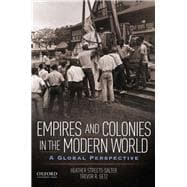In Empires and Colonies in the Modern World: A Global Perspective, Heather Streets-Salter and Trevor R. Getz provide a thorough overview of modern empires and colonialism from the late fifteenth century to the present. Synthesizing the vast outpouring of new scholarship that examines empires in a global context, the book pays as much attention to the Ottoman, Mughal, Ming, and Qing Empires as to European colonialism, and stresses the continuous social, political, and cultural interactions between colonizers and colonized.
Amply illustrated with photographs and full-color maps, Empires and Colonies in the Modern World examines numerous issues--including commodity flows, pan-movements, and anti-colonial activism--that superseded the boundaries of colonies and empires entirely. It calls attention not only to the complexities of the internal dynamics of individual empires, but also to the constant interactions between empires, and between colonies with different national metropoles.








